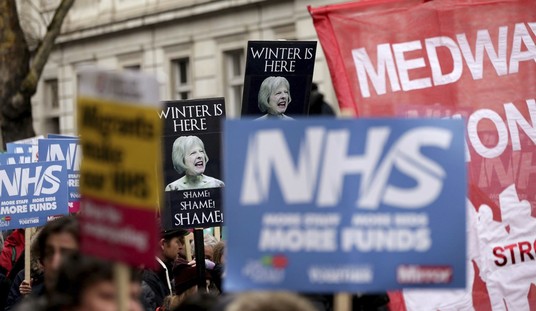Can Congress impeach Donald Trump for obstruction of justice in the firing of James Comey? Sen. Dianne Feinstein (D-CA) made that argument yesterday on NBC’s Meet the Press, telling Chuck Todd that the Senate Judiciary Committee has nearly completed its review of the matter. Feinstein argued that Trump’s action in firing Comey for his refusal to “lift the cloud” by stating publicly that Trump was not a target of the FBI investigation amounts to obstruction of justice.
Nonsense, constitutional law expert Alan Dershowitz told Fox News this morning. Presidents cannot obstruct justice by exercising legitimate authority under Article II of the US Constitution, Dershowitz argues, and that includes the authority to direct the Department of Justice and the FBI, as well as replacing its political appointees (via Townhall’s Leah Barkoukis):
“You cannot charge a president with obstruction of justice for exercising his constitutional power to fire Comey and his constitutional authority to tell the Justice Department who to investigate, who not to investigate,” Dershowitz said during an interview with Fox News.
“We have precedents that clearly establish that.” …
“There’s never been a case in history where a president has been charged with obstruction of justice for merely exercising his constitutional authority. That would cause a constitutional crisis in the United States,” Dershowitz said, hoping Special Counsel Robert Mueller understands that.
“And Sen. Feinstein simply doesn’t know what she’s talking about when she says it’s obstruction of justice to do what a president is completely authorized to do under the Constitution.”
Dershowitz’ argument got the attention of you-know-who:
https://twitter.com/realDonaldTrump/status/937661677700550656
Trump lawyer John Dowd made a different argument to the same end with Axios’ Mike Allen. Dowd responded to accusations from Feinstein and others that Trump’s public comments on the investigation amounted to obstruction, including a tweet this weekend in which Trump claimed he “knew” Flynn had lied to the FB. Dowd said he actually wrote the tweet himself, and that any suggestion that it admitted to obstruction is “ignorant”:
Dowd says he drafted this weekend’s Trump tweet that many thought strengthened the case for obstruction: The tweet suggested Trump knew Flynn had lied to the FBI when he was fired, raising new questions about the later firing of FBI Director James Comey.
Here’s the tweet in question:
https://twitter.com/realDonaldTrump/status/937007006526959618
- Dowd: “The tweet did not admit obstruction. That is an ignorant and arrogant assertion.”
The only way this would be an admission of obstruction of justice would be if Trump had ordered Comey to stop pursuing Flynn. Trump did ask Comey at one point if Flynn could get let off the hook because “he’s a good guy,” according to testimony from Comey himself. However, that conversation took place nearly two months before Comey’s termination, and Comey didn’t stop investigating Flynn, so he didn’t take it as an order, and his termination clearly didn’t stop the DoJ or special counsel Robert Mueller from continuing the probe.
Comey himself didn’t consider it an obstruction of justice, as he also testified, although Comey thought it was clearly inappropriate. If Comey had considered it an attempt to obstruct justice, he would have been required to inform Attorney General Jeff Sessions or ADA Rod Rosenstein, an action he never took. Also, Comey testified that Trump was correct in saying that he told the president that he was not a target of the investigation. It was Comey’s refusal to say that publicly that prompted his firing, not an attempt to thwart other parts of the investigation. That may have been impolitic — it certainly looks that way now — but it didn’t obstruct justice, nor does it appear to have been intended to do so.
Of course, impeachment and removal are political processes, so Congress has to decide what crosses the threshold of “high crimes and misdemeanors” for itself. However, even there Feinstein has it wrong; that has to start in the House, not the Senate, although of course the latter can inform the actions of the former. It would run into one particular buzz saw of history too, in which Congress failed to remove a president that actually committed obstruction and perjury. In the case of Bill Clinton, Feinstein voted “not guilty” on both articles (perjury and obstruction) despite Clinton’s later contempt citation for both in court.
In this case, the president used authority expressly granted to his office by the Constitution. The proper venue for accountability in this case is with the voters. Otherwise, as Dershowitz warns, we’ll have impeachment efforts every time Congress finds itself in disagreement with a president, in which case we may as well adopt a parliamentary system.








Join the conversation as a VIP Member